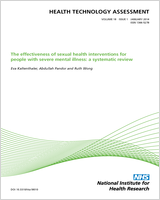Included under terms of UK Non-commercial Government License.
NCBI Bookshelf. A service of the National Library of Medicine, National Institutes of Health.
Julious SA, Horspool MJ, Davis S, et al. PLEASANT: Preventing and Lessening Exacerbations of Asthma in School-age children Associated with a New Term – a cluster randomised controlled trial and economic evaluation. Southampton (UK): NIHR Journals Library; 2016 Dec. (Health Technology Assessment, No. 20.93.)

PLEASANT: Preventing and Lessening Exacerbations of Asthma in School-age children Associated with a New Term – a cluster randomised controlled trial and economic evaluation.
Show detailsIn the UK, the number of visits to the doctor by school-age children with asthma is high at the start of the new school term in September. During the summer holidays (i.e. in August), the number of visits is lower and the number of asthma prescriptions collected also falls.
We wondered whether or not a letter from the general practitioner to the parents or carers of children with asthma, reminding them to make sure that their children take their medication or to collect prescriptions, could help prevent the children from being poorly. It suggested that parents should ensure that their children’s medication is up to date and that they take it for at least 2 weeks before the school return.
To see if the letter worked, we have undertaken a study in England and Wales. General practices were randomly assigned either to sending out the letter (70 practices) or to continue with care as usual (no letter, 72 practices) so that we could see if the letter had any effect.
We found there was an increase in the number prescriptions collected in August and medical contacts such as asthma reviews. These increased contacts did not follow through to reduce the numbers of children seeing their doctor or going to hospital in September, but there was evidence in October to December of reduced contacts. These reduced contacts meant there was evidence of the letter saving costs to the NHS.
General practitioners may wish to implement the intervention to increase prescriptions and scheduled contacts in August. Evidence from the trial suggests that this would not increase costs associated with the asthma management.
- Plain English summary - PLEASANT: Preventing and Lessening Exacerbations of Asth...Plain English summary - PLEASANT: Preventing and Lessening Exacerbations of Asthma in School-age children Associated with a New Term – a cluster randomised controlled trial and economic evaluation
Your browsing activity is empty.
Activity recording is turned off.
See more...